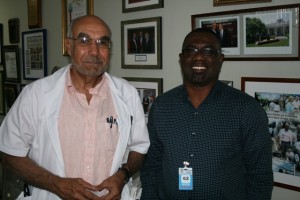Port-au-Prince, Haiti—Mr Dereck Springer, Director of the Coordinating Unit of the Pan Caribbean Partnership Against HIV and AIDS (PANCAP) visited Haiti last week, 2- 5 March, to strengthen relationships with various stakeholders.

Early in the week, Mr Springer met with Haitian Minister of Health, the Hon. Dr Florence Duperval Guillaume and other members of the Ministry as part of this four-day mission to Haiti.
While the goals of the mission were multifaceted, one important objective was to forge closer collaboration and participation at both the policy and technical level between PANCAP and Haiti. Dr Joelle Deas, the National HIV Coordinator for Haiti, will represent her country for the first time at the upcoming 23rd meeting of the Priority Areas Coordinating Committee (PACC), which serves as the technical advisory body of PANCAP.
PANCAP, in partnership with by Population Services International (PSI), Haiti and the CARISMA IV project has been working to implement a portfolio of programmes aimed at women’s sexual reproductive health services; family planning programs to encourage men to support their partners use of family planning; and HIV reduction among the most at-risk populations in Haiti. This programme, funded by Kreditanstalt für Wiederaufbau [KfW] (German Development Bank) will come to a close later this year.
Mr Springer visited Eben Ezer Hospital in Croix Bouquets and lauded the efforts to provide much needed sexual reproductive and other health services via the private sector. This is one of fourteen sites across the country that has received support through the KfW-funded programme to provide cervical cancer screening and treatment, as well as the provision of modern birth control methods to women seeking quality family planning services. While the hospital is privately run, it is able to offer high-quality services at very affordable prices. Hospitals like Eben Ezer fulfil an important demand in the marketplace by providing vulnerable populations with more healthcare options. Dr Dorcil, Medical Director of Eben Ezer, said the hospital receives no donor funding other than the support for cervical cancer screening and treatment, yet manages to thrive. Mr Springer praised the level of commitment of the staff, saying, “People aren’t just doing this for the money; people have their hearts in this.”
Hon. Minister Dr Guillaume has been pleased with the success of these programmes in helping to prevent HIV in Haiti while recognising the need to ensure that these programmes are sustainable and can continue independent of donor support. It was agreed that the PANCAP/Haiti collaboration would enable the member state to share its successes including the PSI/Haiti ‘social franchise’ model of health care facilities such as Eben Ezer with the region.
Later in the week, Mr Springer visited Dr Jean William Pape, Director of GHESKIO Centre at the National Institute of Labs and Research. Dr Pape has been a pioneer in providing holistic and complementary health services to some of the most vulnerable people in Haiti. He has been involved in the care and treatment of people living with HIV in Haiti since the first cases appeared, and he continues to be a staunch proponent for preventing new cases while providing the best possible care for those living with HIV and AIDS. Dr Pape advocates an integrated approach to HIV, “In healthcare, you cannot just look at those who are already infected, you have to look at prevention,” he explained. The GHESKIO Centre, working in close partnership the Ministry of Health, is dedicated to the improvement of health care through prevention, clinical care, research and training. GHESKIO offers an integrated model of prevention and care of HIV and associated diseases.
In addition to the support provided to the health facilities such as Eben Ezer, PSI, with the support of KfW has been very successful, through its ‘total market approach’ to condom social marketing, in increasing condom usage among the most at-risk populations and to increase the knowledge and use of modern family planning methods to couples who wish to choose when and how many children they have.
By applying an evidence-based social marketing approach, PSI uses generic and branded messaging to promote consistent and correct condom use through interpersonal, mid-media and mass media strategies. This strategy is complemented by efforts to ensure broader condom availability nationwide. The combination of a comprehensive, effective behaviour change program and increasing condom availability in the private sector not only encourages the adoption of healthier behaviours, but facilitates access to affordable, high-quality condoms.
PSI works with peer educators conducting community-level intervention sessions targeted at reducing the spread of HIV among sex workers and men who have sex with men by encouraging condom use; and with couples to promote family planning by educating both men and women on the modern options available to them to help avoid unplanned pregnancies. There is a specific focus on men aimed to educate them on the importance of family planning and to encourage them to support their partners in the use of a family planning method.
Mr Springer was accompanied by Ms Monica Brinn, Communications Specialist, PANCAP Coordinating Unit and Ms Sarah Romorini, Social Marketing Consultant, PSI. The mission was coordinated by the PSI, Haiti Team headed by Ms Anick Supplice Dupuy, Executive Director.
